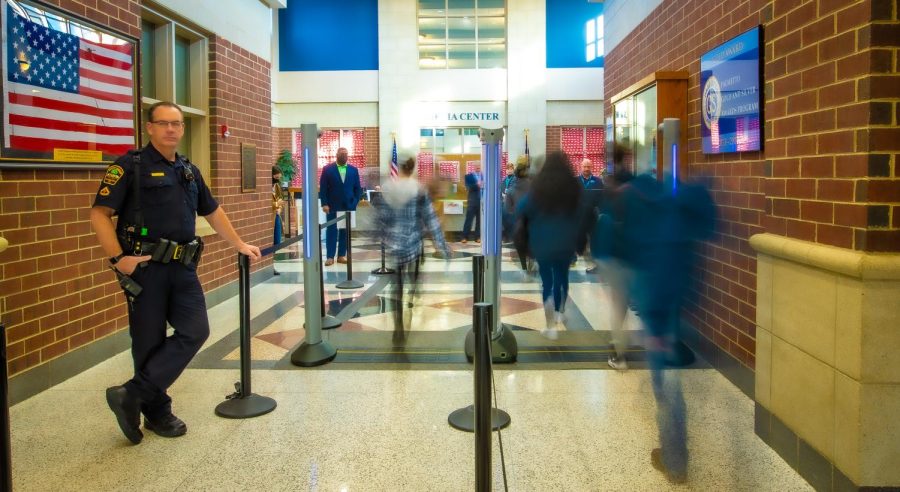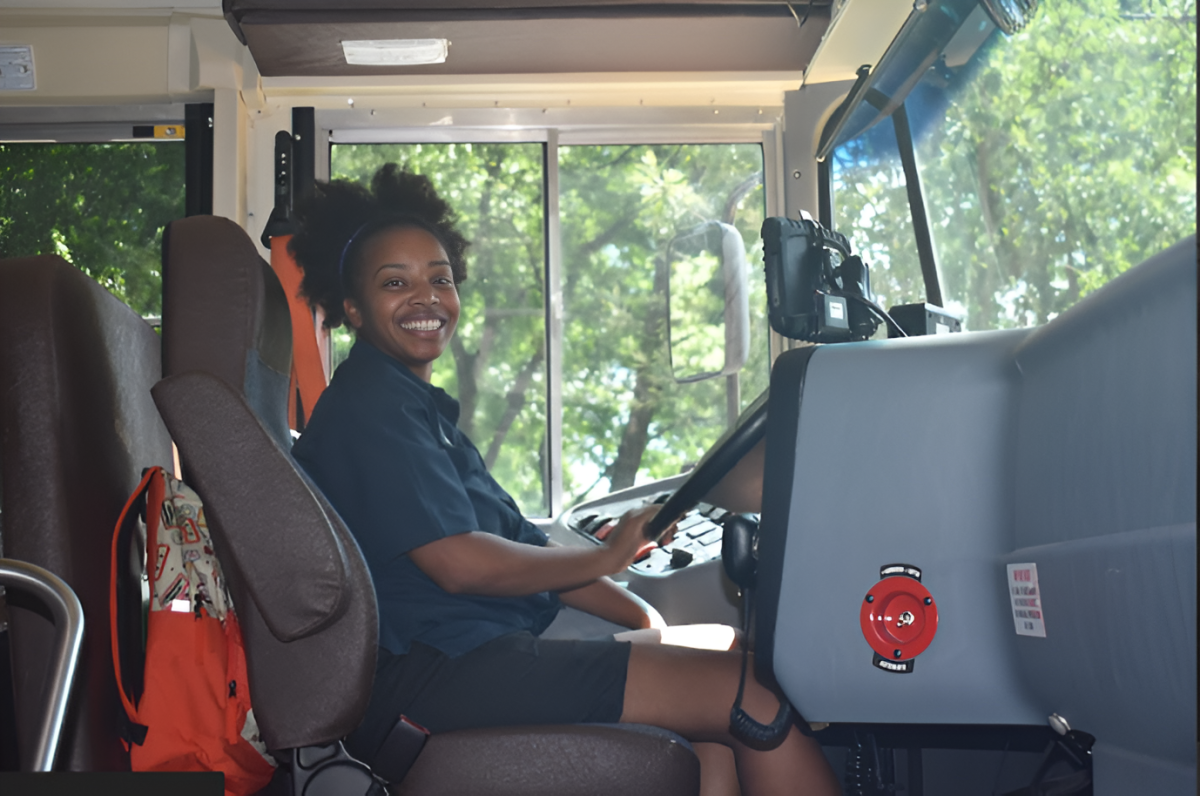Atlanta Public Schools to install body scanners in middle, high schools
Evolv Technology body scanners function in the Spartanburg, South Carolina School District 6. The body scanners have led to the district being able to complete an average bag check in less than 20 seconds and sustain detection without security queues.
September 29, 2022
The Atlanta Board of Education unanimously approved a $2.6 million investment to purchase body-scanning weapon detection equipment for the school district’s middle and high schools.
New body scanners from Evolv Technology will be installed in schools by the start of the second semester or earlier, the board said. Students will be required to pass through the scanners to enter schools in the mornings.
Atlanta Public Schools Police Chief Ronald Applin said the investment comes after a continuous discussion over school safety. According to a statement from APS, 27 guns were found or confiscated from schools last year.
“It has been an ongoing discussion, but the weapons discovered and long lines [with metal detectors] were key [to the investment],” Applin said. “This is just one of many layers we are using to deter people from bringing unwanted items into our schools.”
Body scanners, according to Evolv Technology, link sensor technology with artificial intelligence, security-based ecosystem integrations and thorough analytics. In the Spartanburg, South Carolina School District 6, the body scanners have led to the district being able to complete an average bag check in less than 20 seconds and sustain detection without security queues.
“We wanted a very easy feel for our students and our visitors walking in our school [and] we wanted to keep the positive culture that we had in place,” Dr. Mark Smith, the school district’s director of student services and transportation, said. “Our community, children and parents all supported putting the systems in our schools.”
Evolv Technology said its body scanners are 10 times faster than metal detectors. At Midtown, students would be able to freely walk through without bag checks while still being screened with the assistance of image-aided alarms.
“The [body scanners] will provide a more efficient screening process during intake while providing a reliable method for detecting weapons,” Applin said.
In terms of safety at Midtown this year, Spanish teacher Liliana Ortegon said she feels slightly out of sorts, especially after the Ulvade school shooting in Texas in the spring.
”I think that if you are a teacher, regardless of where you teach, you just feel overwhelmed,” Ortegon said. “Sadly, school shootings are now part of the reality of the profession.”
Metal detectors have been in place at Midtown since the beginning of the school year to re-enforce safety precautions. Non-instructional staff run the system, one of whom is bookkeeper Alex Coffman.
“I think we do the best we can, where I’m stationed is off 8th Street,” Coffman said. “All the buses drop off between 8-8:25 a.m. So, sometimes we could have three buses unloading at once. We can’t [check] every student, and if we did, they would be wrapped around the block. Kids might not get their breakfast, as well; so, we try to move them through as efficiently and as fast as we can.”
Ortegon agrees with Coffman and said the metal detectors are insufficient.
“I think that the metal detectors, in general, are not enough,” Ortegon said. “Administrators and police officers do their best based on their training, but the measure doesn’t treat the root of the problem.”
While Evolv Technology will provide APS schools with body scanners, Adapt to Solve is the statewide contractor for the devices. Evolv Technology’s body scanners are also located in Lenox Square Mall and Mercedez-Benz Stadium.
“Our goal is to create an environment to discourage bringing any unwanted items out of our schools,” Applin said. “There is no foolproof way to prevent weapons, but if one person is deterred from this layered approach, we are all better off.”
Mercedez-Benz Stadium has had reduced line times after installing body scanners.
“Nine out of 10 fans now say that the security screening process is not a point of contention for them,” Greg Overstreet, the stadium’s security director, said. “We see it on the NFL reporting as well, where we rank in the top quarter of all NFL stadiums in response from fans regarding the entry experience.”
Junior Eamon Walsh appreciates the emphasis on safety and security this year through metal detectors but still thinks the current process is inefficient. He said he thinks the implementation of body scanners would improve safety efficiently as it has at Mercedes-Benz Stadium.
“After hearing about this board decision, I was indecisive of where I was opinion-wise since $2.6 million is a lot of money,” Walsh said of the amount APS is spending on the devices. “I wanted to make sure that these body scanners are actually going to improve the issue, and upon further investigation, I noticed that they are a cutting edge technology that will very much speed up the process of weapon checking and make it so that [personnel] don’t have to check everyone’s bags. Using a scanner will just make the flow of things so much quicker and more efficient, and honestly, I would feel a lot safer.”
Applin said the scanners will be in place, in addition to the existing metal detectors, creating a layered system of security. However, Coffman has doubts about this approach.
“Anything that we can do to keep our staff and students safe, we need to do, but the metal detectors are bulky, and our school is tight,” Coffman said. “I just don’t know where we would put all this equipment and still make it feel safe and positive for students at the door. It’s a rough entry into the school building. We try to make it as pleasant as we can, but I don’t want to see a school turning into a prison.”
Coffman said the body scanners should be installed at various entrances around the school, most notably the main office, where students enter after 9:15 a.m.
“You can’t just focus on the cafeteria doors [since] we have many doors to enter school,” Coffman said. “I think that not having a main office strategy is an issue for safety. If you wanted to do something bad, you would just come late to school and enter through the main office.”
Applin says the next few months will be focused on the acquisition of the scanners, their deployment to APS middle and high schools and the delivery, training and standard operating procedures for the scanners.
“We know that students can be more effective learners and that teachers can be more effective teachers in a safe and secure environment,” Applin said. “We are willing to do all we can to that end.”
Coffman hopes that, with the installation of the body scanners in schools, additional security personnel can follow.
“I think we’ll need a lot more manpower because when you’re trying to scan 1,600 students within 45 minutes, that’s a lot of kids walking through,” Coffman said. “I’m sure they’ve got some kind of training in place because this has just happened, but I really feel like the board needs to invest in either security personnel or someone to help us because we’re stretched pretty thin. It’s a lot to grapple with.”
Walsh said students will feel a lot safer at school once the body scanners are in place.
“I feel like I can speak for most of the student body, and of course myself, when saying that we would all feel a lot safer having these body scanners,” Walsh said. “Of course, they actually do a great job at detecting weapons, and they’ll help make sure that our school environment is safe for learning.”








